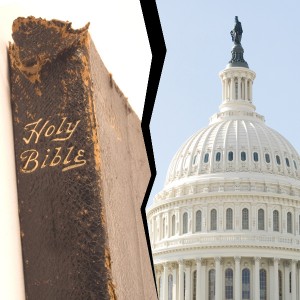On The Hill: Which Religions Care Most About Church-State Separation?

This week I attended an event at the Brookings Institution in Washington, DC, which focused on the 2014 American Values Survey created by the Public Religion Research Institute (PRRI). PRRI has been doing this survey since at least 2008, which covers topics from the economy to religion and racial issues.
Here are some of the highlights from this year’s report:
- Nearly 60% of black Americans live in households with moderate or high levels of economic insecurity, while less than 40% of white Americans reside in households with moderate or high levels of economic insecurity.
- 55% of religiously unaffiliated registered voters prefer Democratic candidates in the upcoming 2014 elections, showing that our community is not as partisan as some would say.
- 76% of black Americans, 62% of Hispanic Americans, and 58% of Asian Americans say that one of the biggest problems in America is that not everyone is given an equal chance at succeeding in life, while only 50% of white Americans agree with this sentiment.
The survey shows a clear racial, economic, and religious divide on many of the most important issues of the day, but the data that I found to be most significant had to do with the practice of religion and concerns over the blending of religion and government.
According to the survey, 46% of Americans are concerned about “perceived government interference with the ability of citizens to freely practice their religion” while another 46% of Americans are more concerned about “religious groups trying to pass laws that force their beliefs on others.” This is a fascinating finding, not only because it shows how evenly divided Americans are on this issue, but because it indicates that the church-state separation concerns of nontheists and secularists are shared by other Americans who may themselves be religious. Humanists should take comfort from the fact that we are not alone on this issue, and that many Americans respect the secular nature of our government.
This figure is even more interesting when you break it down by religious identification:
- 66% of white evangelicals are concerned with their ability to freely practice their religion; only 27% of white evangelicals are more concerned with religious intrusion.
- 57% of Hispanic Protestants and 46% of white mainline Protestants are concerned with their ability to practice their religion; only 33% of Hispanic Protestants and 45% of white mainline Protestants are more concerned with religious intrusion.
- On the flip side, 50% of white Catholics and 53% of Hispanic Catholics are concerned about religious intrusion into government; only 46% of white Catholics and 36% of Hispanic Catholics are more concerned with their ability to practice their religion.
- Black Protestants deviate from white and Hispanic Protestants, as 48% of black Protestants are concerned about religious intrusion into government; only 40% of black Protestants are more concerned with their ability to practice their religion.
- Jewish and religiously unaffiliated Americans remain strong supporters of church-state separation. 64% of Jews (the highest number of any religious group surveyed) and 63% of the religious unaffiliated are concerned with religious intrusion; only 32% of Jews and 31% of the unaffiliated are more concerned with their ability to practice their religion.
Several other factors, such as political beliefs and age, affect the position of Americans on this issue:
- 66% of Tea Party supporters and 64% of Republicans are more concerned about their ability to practice their faith than religious intrusion in to government, while 59% of Democrats are more concerned with religious intrusion.
- 52% of young adults are more concerned with religious intrusion, while 52% of seniors are more concerned about their ability to practice their faith.
As the religiously unaffiliated continue to grow, it’s fair to assume that more and more Americans will become increasingly concerned with the attempts by religious groups and individuals to enshrine their often exclusionary beliefs into law. But this survey shows that we don’t have to fight this battle alone—religious groups like Jews, Hispanic Catholics, white Catholics, black Protestants, and nearly half of white Protestants share our concerns and are natural allies as we work to defend church-state separation.
The American Humanist Association has long worked in coalition with progressive religious organizations in Washington, DC. It’s time for humanists and nontheists of all stripes to join hands with religious Americans who support secularism in order to beat back the catastrophic influence of the Religious Right on our government.
